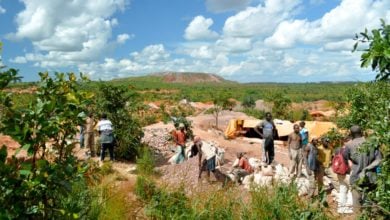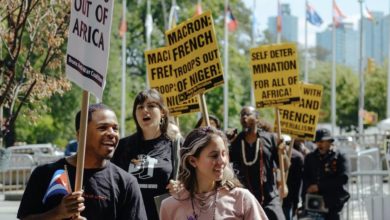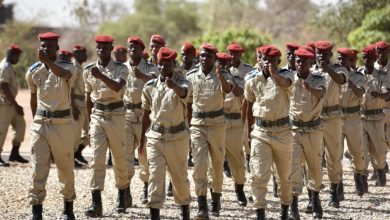Throughout the 1950s, 60s and 70s, a wave of revolutionary fervor swept through much of the oppressed world. In the Caribbean, street rebellions and strikes characterized widespread popular resistance to the established power structure.
Initially targeting British and French colonial regimes, the people’s struggle for freedom took on new forms following independence. With many of the newly independent governments taking a neocolonial form by preserving the economic domination of the former colonial powers, many of these movements began to struggle for self-determination free from all forms of exploitation.
Guyanese activist and Marxist scholar Walter Rodney emerged from these post-colonial struggles. Rodney advocated a class analysis based on multinational workers’ unity. Although he faced threats and repression throughout his life, Rodney fought for socialism as a respected historian, professor and most importantly, a dedicated political organizer.
It was his work as a political organizer that led to his assassination in his native Guyana on June 13, 1980.
Colonial Guyana
Born in Georgetown, Guyana on March 23, 1942, Walter Rodney began his political formation at an early age. Guyana was at that time a British colony. His father, a tailor, and his mother, a seamstress, were both active in the formation of Guyana’s anti-colonial People’s Progressive Party. At age 11, Rodney remembers attending organizational meetings and passing out party literature. In his collection of essays, “Walter Rodney Speaks,” he described learning where to and where not to pass out leaflets. “You could tell from the kind of house or the shade or complexion of the lady reclining, sipping her tea,” he wrote. In this way, Rodney first experienced the racial and class divisions of Guyanese society that were systematically fostered during British colonial rule.
The Guyanese working class was divided between Afro-Guyanese, descendants of slaves, and Indo-Guyanese, whose ancestors had been brought to Guyana in large numbers from India after the abolition of slavery in 1823. Afro-Guyanese were more concentrated in the urban areas around the capital city of Georgetown and in the mining industry, while Indo-Guyanese were mainly agricultural workers in the sugar fields.
Education for liberation
As a youth, Rodney was an excellent student. He received scholarships throughout his entire schooling. While these scholarships were used as a means of co-option by the colonial government, Rodney grew to become an outspoken critic of European capitalist and imperialist expansion.
When he was 24, Rodney earned his Ph.D. in African History in 1966 from the School of Oriental and African Studies in London. His doctoral thesis, titled “A History of the Upper Guinea Coast 1545-1800,” critically examined the West African slave trade and its development of the capitalist system.
In addition to his formal education, Rodney carried out extensive independent studies. He also became a student activist. At the University of the West Indies in Jamaica, where he received a bachelor’s degree in history, Rodney had campaigned for Jamaica’s withdrawal from the West Indies Federation, a post-colonial alliance run by Great Britain.
In London, Rodney held street meetings in the famous Hyde Park. He participated in a study group led by the Trinidadian Marxist C.L.R. James. It was in the course of these discussions that Rodney developed his understanding of the dialectical materialist approach to history.
‘Grounding with my brothers’
After receiving his doctorate, Rodney traveled to Tanzania to teach at University College in Dar es Salaam. For two years, he taught African history and continued his research on the West African slave trade—learning Portuguese and Spanish along the way. In 1968, he was invited back to Jamaica to teach African History at his alma mater, UWI.
Rather than confine himself to the classroom, Rodney broke out of the isolated academic atmosphere and traveled to the “gullies”—the sprawling poor neighborhoods—of Jamaica. Speaking in the poor, working-class neighborhoods of Kingston as well as to Rastafarian communities throughout the island, Rodney sought to make a genuine connection with the poorest masses and their struggle against oppression. “The system says they are nothing, they are illiterates,” Rodney wrote in his book, “Grounding With My Brothers.” “But with the Black brothers you learn humility because they are teaching you.”
The Jamaican government, closely tied to British imperialism, viewed Rodney’s efforts to organize the country’s most marginalized and impoverished communities as a “threat to national security.” Declassified documents from the Jamaican government reveal extensive state surveillance on Rodney throughout this period of his life.
In October 1968, Rodney traveled to Montreal, Canada, to participate in the Congress of Black Writers. Thousands attended this conference, which featured speakers like U.S. Black liberation leader Stokely Carmichael. Speaking on topics like “African History in the Service of Black Revolution” and “Statement on the Jamaican Situation,” Rodney stood out for his sound arguments and unique perspective. He sharply criticized the neo-colonial regimes in the Caribbean, noting for example, “Since ‘Independence’, the Black police forces of Jamaica have demonstrated that they can be as savage in their approach to Black brothers as the white police in New York, for ultimately they serve the same masters.”
The ‘Rodney riots’
Immediately following this conference, Rodney was denied re-entry into Jamaica. Parliamentary hearings were held, with then-prime minister Hugh Shearer denouncing Rodney as “an undesirable alien” who represented a communist threat. Pro-government legislators cited Rodney’s travels to Cuba and the Soviet Union.
Word quickly spread of Rodney’s expulsion. Protests and street battles broke out across the country the following day. At the UWI campus in Mona, student demonstrations shut down the university. Students and Kingston youth united in a militant march to the offices of the prime minister in defense of Rodney. The widespread resistance and the police violence to repress it caused millions of dollars in property damage.
From Montreal, Rodney told the Congress of Black Writers how “certain known enemies of the people were spat upon, dragged out of their cars and beaten.” There were 14 major fires throughout the city. Over 50 buses were overturned.
As the world looked on, the ruling-class media tried to downplay the significance of this uprising by claiming that they only involved disgruntled students. Rodney, however, demanded: “Let us stop calling it student riots. What has happened … is that the Black people of the city of Kingston have seized upon this opportunity to begin their indictment against the Government of Jamaica.”
The “Rodney riots,” as they later became known, were the largest people’s uprising in Jamaica since a mass rebellion initiated by sugar and dockworkers in 1938.
‘How Europe Underdeveloped Africa’
Following his expulsion, Rodney returned to Africa. He took up his prior teaching position and dived back into Tanzanian political life. In 1972, during this period, Rodney completed his most influential work, “How Europe Underdeveloped Africa.”
Applying historical materialism to African history, Rodney systemically destroyed the myth that prior to European intervention Africa was a “backward” continent characterized by its own local form of slavery. He explained that while Africa is extremely rich in minerals, fertile soil and raw resources, its people became impoverished due to the systematic exploitation by the European capitalist powers. The Europeans imposed an export-driven economy on the continent, exporting raw materials and slaves and then importing finished products. Instead of investing locally in schools, hospitals and roads, profits were expropriated into colonial coffers.
On a social level, colonial institutions used culture and language to “divide and conquer” Africa, while restricting access to opportunities such as higher education. Rodney asserted that it was within this context of enforced capitalist underdevelopment that the neocolonial struggle must be understood.
“How Europe Underdeveloped Africa” became a standard in studying African history. It influenced not only intellectuals but the political leaders of the African anti-colonial and independence struggles. “The purpose,” Rodney said of the book, “has been to try and reach Africans who wish to explore further the nature of their exploitation, rather than to satisfy the standards set by our oppressors and their spokesmen in the academic world.”
The challenges of liberation
Believing that “a revolution has to be made by the people who are going to be grounded in that situation,” Rodney returned to his native Guyana in 1974. Despite a government block on his invitation to teach at the University of Guyana, Rodney was determined to take part in the struggles taking place among the Guyanese working class.
Guyana had achieved self-rule in 1961 and nominal independence in 1968. The most prominent political parties that emerged from the independence struggle were the PPP, at that time headed by Cheddi Jagan, and the People’s National Congress headed by Forbes Burnham. Both of those parties were influenced by the growing strength of the socialist camp throughout the world, especially the Soviet Union, the People’s Republic of China and the recently victorious Cuban revolution.
Despite those socialist influences, the problems facing independent Guyana were severe. Guyana was one of the poorest countries in the Western Hemisphere. Its population of only around 500,000 was overwhelmingly still agricultural and subject to the world capitalist market.
These difficulties were exacerbated by continued British intervention and, increasingly U.S. intervention. U.S. imperialism was on a continental crusade against any movement or government that sought to replicate the success of the Cuban socialist revolution.
One primary tactic used by the imperialists to weaken an independent Guyana was a divide-and-conquer approach to the Afro-Guyanese and Indo-Guyanese populations. British agents used this policy in every one of their colonial holdings—from Ireland to Palestine to India.
The PNC and the PPP both professed socialist goals. But increasingly in the period leading up to independence they became rooted in different ethnic populations, with the former based in the Afro-Guyanese communities and the latter in the Indo-Guyanese.
In 1964, the PNC’s Forbes Burnham became president—an office he held until his death in 1985. Burnham declared the government to be a “cooperative socialist republic.”
Throughout the 1970s, Burnham received support from the Soviet Union and its allies, especially after he nationalized the bauxite industry and seized the assets of large sugar plantation owners. However, this support was undermined by government corruption, continued ethnic division—and the continued existence of a small Guyanese bourgeoisie with interests opposed to those of the Guyanese working class, whether Indo- or Afro-Guyanese.
The Working People’s Alliance
This was the political context that Walter Rodney entered when he returned to Guyana. He quickly joined the newly formed Working People’s Alliance, becoming one of its leading members.
The WPA had emerged as an alliance of several Indo- and Afro-Guyanese organizations, emphasizing the need for working-class unity. One of its early documents, “Towards a Revolutionary Socialist Guyana,” describes the WPA as a Marxist-Leninist organization.
The WPA set up educational classes, held community meetings and supported trade unions throughout Guyana. Rodney and the Working People’s Alliance developed a program of “critical exposure” and sought to unite the Guyanese working class. Its organ Dayclean criticized Burnham as a dictator of the bourgeoisie. After becoming an official party in 1979, the WPA entered the electoral arena.
Declining living conditions in 1978 and 1979, combined with increasing political instability, contributed to a wave of strikes and protests by the Guyanese working class. The WPA tried to intervene in these protests to give them a political character. In the 1979 pamphlet, “People’s Power, No Dictator,” Rodney described the power that the people demonstrated, saying, “The entire nation got a feel of what united working-class action could mean.”
In response to widespread resistance, the Burnham government imprisoned WPA activists and suppressed protests. At a public meeting in Georgetown in 1980, Rodney defiantly stated, “We are reaffirming our commitment to struggle … we recognize the pressures, but are far from bending under those pressures.” A week later, amid a WPA electoral campaign, Rodney was assassinated. An explosive device destroyed his car while he was driving with his brother, Donald. To this day, no one has been held officially responsible for his death.
Despite his short life, Walter Rodney is remembered around the world as a man dedicated to working-class struggle and to the Pan-African movement. As a scholar, Rodney showed the relevance of the Marxist tradition of historical materialist analysis to the problems facing African liberation.
Over 25 years later, Rodney remains an example to progressives and revolutionaries around the world. The struggle for socialism—which Rodney believed would inevitably succeed—gained an example of an intellectual devoted to the struggle of the working class and to the struggles of Black people for liberation.





